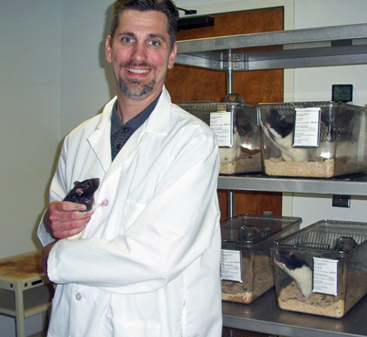Department of Psychology


Why rats? "Well, for starters, rats are clean," says psychology professor Dr. John Widholm. "But I choose to use rats in my experiments because my work revolves around determining how developmental exposure to environmental chemicals disrupts human behavior, so I need an animal that is similar to humans with respect to gestation and lactation."
Therefore, Dr. Widholm has been using rats as his "guinea pigs" in experiments ever since graduate school.
Like most psychology majors, Widholm went to undergraduate school (University of Maryland) with clinical aspirations. To gain clinical experience, Widholm volunteered at St. Elizabeth's mental hospital in Washington D.C., but as he continued to take psychology courses he soon realized his true desire was in research. "I was absolutely fascinated with the idea of understanding animal behavior, so I decided to switch my focus from clinical psychology to conditioning and learning," Widholm says.
Upon earning his B.A. at the University of Maryland in 1988, Widholm went on to graduate school at American University in Washington, D.C. There, he worked under Alan Silberberg, his primary graduate advisor, studying the behavior of pigeons under the control of reinforcement schedules and applying the theories of economics to animal behavior, an endeavor known as behavioral economics. As a graduate student his research with pigeons evolved into research with rats when he began working as a graduate research assistant in the laboratory of Richard Bauman at the Walter Reed Army Institute of Research. Widholm helped conduct behavioral toxicology experiments in rats designed to help the Army assess how different chemicals and drugs would affect our nation's troops.
After earning his Ph.D. from American University in 1997, Widholm then completed a postdoctoral research fellowship at the University of Illinois performing research designed to investigate whether contaminants found in lakes such as the Lake Michigan and Lake Ontario are responsible for reductions in intelligence in children and other possible childhood disorders.
During his postdoctoral research he worked closely with Susan Schantz, designing experiments using rats that modeled aspects of human environmental contaminant exposure. "That position was exciting for me because it was a change of research focus for Dr. Schantz, so it allowed me to use my expertise in operant conditioning while learning a lot about toxicology and neuroscience from Dr. Schantz," Widholm says.
In 2003, Widholm was invited to the College of Charleston for an interview and was immediately "sold" on the college and the members of the psychology department. Soon, he and his wife Diana and their two sons, Calvin and Brett, moved to Charleston. "I've been asked why I came to Charleston so many times before and I always have the same answer," he said. "The College of Charleston is a great place, but it was the hospitality that won me over."
Widholm is now teaching and researching at the college and has no plans of leaving Charleston anytime soon. "A balance between teaching and research are certainly valued here at the college," Widholm says. "So I get the best of both worlds."
In his years at the college, he has received four internal college-wide grants, including three Summer Undergraduate Research with Faculty Grant. The SURF grant is a student-driven grant used to pay a student and purchase equipment to conduct research over the summer. It is an important mechanism to allow students the opportunity to conduct meaningful research at the college.
Last semester, Widholm took a sabbatical to spend time conducting drug addiction research at the Medical University of South Carolina in the laboratory of Dr. Foster Olive. This experiment used rats to model the behavior of human methamphetamine addicts. In this experiment, indwelling catheters were implanted into the rat's back so that they could receive infusions of methamphetamine when they pressed a lever. Widholm explained that drug-addicted patients often undergo a behavioral treatment known as "cue exposure." Cue exposure occurs when humans are exposed to stimuli associated with their drug habit with the goal of reducing the ability of these stimuli to elicit drug cravings and relapse.
"The experiments I conducted at MUSC were designed to model this aspect of treatment using rats with the goal of improving its effectiveness for human patients," he says. Widholm was clearly satisfied with his sabbatical because it "allowed me to immerse myself in a neuroscience environment." Widholm suggested that one of the perks of being in academia is that you get to immerse yourself in different environments.
"I want to keep learning. Learning is a life-long undertaking and teaching keeps you on your toes," he says.
At the College of Charleston, Widholm currently teaches a lecture and lab course in Conditioning and Learning. He also teaches many other courses such as Introduction to Psychology, Psychological Research Methods, and one of his favorites, the Honors Introduction to Psychology, which requires the students to conduct psychological research as part of the class.
"Dr. Widholm has been more than an asset to the College of Charleston psychology department as a teacher, he reminds us how important the research aspect of psychology is," says psychology major Alexa Corn.
When asked the one piece of advice or knowledge he'd want all students to take away from his class, Widholm says: "Psychology is an amazing endeavor. We are all unique and psychology helps us to understand how people behave, and why we are the way we are. In the end, I hope that all my students walk away from my classes with some appreciation of psychology, regardless of what their interests or professional goals may be."
###